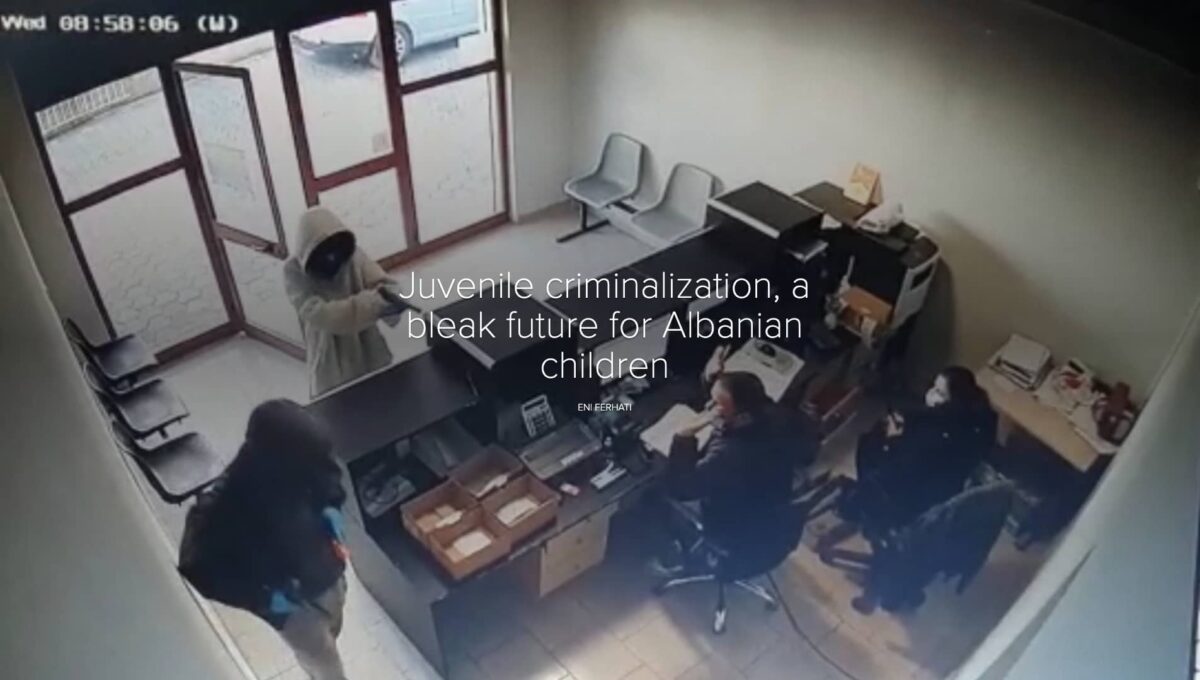To read this article in Albanian click here
Statistics provided by Investigative Network Albania show that 1600 juveniles were suspected of committing criminal offenses during 2021. According to experts, family problems are the starting point of juvenile “adventures”, which are increasingly involved in serious crimes, such as sexual harassment or drug trafficking.
Author: Eni Ferhati
In the late hours of September 26, 2019, the “Eagle” police forces stopped a group of young people sitting on the benches of the New Boulevard in Tirana. Based on the request for trial, available to Investigative Network Albania,the police found 8 pharmaceutical bags of hashish in one of the youngsters’ pockets.
According to the testimony of the young man, he had taken the drug from a relative of his, who turned out to be a minor, citizen E. D., 17 years old. A day later police tracked down the teenager and arrested him in flagrante delicto in the Babrru area along with his 15-year-old friend, A. C., with 16 pharmaceutical bags of cannabis sativa.
In the vehicle where they were stopped, the juveniles were accompanied by two adults, one of them a woman, who at trial would declare that she had also bought cocaine from the juvenile A. C.
On suspicion of being involved in a drug distribution network, police conducted a search of the apartment of the juvenile A. C., where they found another quantity of hashish, over 300 grams, divided into doses, in jars, ready for sale.
Meanwhile, in the apartment of his friend, also a minor, E. D., an iron handle and some bullets were found.
“A … deals with the sale of narcotics, cannabis and cocaine. He told me several times that he has narcotics at home and, at the moment he told E … that he needs drugs for his uncle’s son, F … he replied: “I will bring the narcotics”, – declared the minor, E.D.
The juveniles were initially investigated while held witha the security measure “Prison arrest” and then with “Home arrest”, while in court they requested a shortened trial, accepting the charges.
The story of these two juveniles is just one of hundreds of cases, which according to data provided to Investigative Network Albania every year are charged with various offenses, ranging from drug sales and sexual crimes to theft.
According to the annual reports of the prosecutors in the country, during 2020, about 600 juveniles were held as defendants for various criminal offenses.
Meanwhile, the data reported by the State Police speak of an even more dramatic situation among juveniles. During 2021, according to the State Police, about 1600 juveniles have been identified, suspected as perpetrators of criminal offenses.
The high number of recidivist juveniles, who are in conflict with the law several times, remains a major concern.
During 2020, the Durrës Prosecutor’s Office held 59 juveniles as defendants, most of whom are in the 16-18 age group, of whom 21 were repeat offenders..
The report of this prosecution office, provided by INA MEDIA, states that these juveniles have been previously convicted and in cases of flagrante delicto committing another criminal offense, criminal proceedings have been instituted with their arrest.
The Durrës Prosecutor’s Office links the high number of recidivist juveniles to the great economic difficulties of the latter, the lack of special institutions and their abandonment by parents.
“The reason for this problem is the non-existence of relevant institutions for the treatment of these minors, who in a way have been abandoned by their parents and as a way of survival have committed criminal offenses, mainly theft,” – reports the report of Durrës Prosecutor’s Office for 2020.
What crimes do juveniles commit
Theft, driving without a license, distribution of narcotics, wounding with sharp tools are the main criminal offenses, involving minors; Most worrying is the fact that, according to the data, in the vast majority of the cases these acts are committed in collaboration, i.e. by 2 or more minors.
Theft is the most common offense among young people, where they are suspected as perpetrators in 40% of cases and in about 20% of cases they are accused of violating traffic rules. Paradoxically, in these cases the vehicle is generally provided by the parents.
Sex crimes, drug distribution or injury is another troubling range of criminal offenses involving juveniles, are accounting for 40% of the total offenses. Initially everything starts as an adventure, from which it turns out that they find it difficult to get out.
“The minors, who are involved in theft, start it as an adventure, they do not understand what they are doing, they like the income, they feel euphoric about the action they have committed and they repeat it or they think that they are elusive. The social circle also has a great influence, where they encourage each other or cooperate to oerform these acts”, – police psychologist Elidon Shehu, who has assisted hundreds of cases, tells INA MEDIA.
But the concern for experts dealing with juveniles remains the growing number of young people involved in crimes that are classified as serious. One of the most common crimes is sex crimes.
“Referring to the case law, personally the most impressive cases of crimes, which involved minors as perpetrators or even their victims, were sexual crimes. Unfortunately, sexual crimes, committed by juveniles as perpetrators and against juveniles as victims of sexual abuse, are increasing”, – says for Investigative Network Albania Tereza Merkaj, judge in the Court of Tirana, in the field of juvenile justice.
“Threatening minors to force them to engage in sexual activity against the publication of intimate photos or videos containing sexual acts, where the juvenile is involved with his/her consent with a partner or boyfriend/girlfriend, are numerous recently. In these cases, the adult or juvenile perpetrator, by threatening the victim with the publication of a fact that would seriously damage the honor or reputation of his/her or the person closely related to min/her, has forced them to engage in sexual intercourse with him or her and with other people”, – adds further Professor Merkaj.
Typology of juveniles involved in crime
Juveniles, who are involved in the field of narcotics, always start it as a joke, as something they do not have or will not be addicted to. A considerable part starts as a challenge to peers, but then get stuck in this trap and end up as distributors as well.
“For the most part, they start using it in groups of friends or parties, where the control is smaller. They then want to look older or braver than their peers and increase their consumption of these substances. Some others start to deal with sales, as they provide good income. The security given to them by their tutors, but also the economic independence has a very big impact on these people against their peers”, – says psychologist Elidon Shehu.
Also, minors, who are involved in conflicts with their peers, are a very disturbing phenomenon, due to their aggressiveness and size. Quarrels generally start online and then end up being “straightened out” with fists and knives.
For the most part, these minors start conflicts on social networks, after these debates they assign a place to “sort out their differences”, where violent conflicts between them start. These conflicts mainly occur near high school premises. “From these conflicts, there were also minors who were seriously injured, but also with fatalities for life”, – says Shehu.
The wonder with parental behavior goes so far that adults give the vehicle to a minor, even though it is clear that they are breaking the law.
“It also turns out that the people who entrust the means to these minors are their parents, relatives or friends, who do not understand the danger that these minors may have. The model given by society is also worrying, being exposed on social networks and often becoming trendy for young people”, – says the official of the Tirana Police.
The bleak future
Rising statistics of juveniles involved in crime are evident in almost every city in the country.
“It is very important to pay special attention and care to minors, as individuals who commit illegal acts at a very young age are more predisposed to repeat them, thus becoming more problematic in later adulthood”, – says in an interview for INA MEDIA the head of the Elbasan Prosecutor’s Office, Kreshnik Ajazi.
The other risk is that juveniles can be used by adults in criminal activities and cases are not lacking.
“They can be easily pushed and exploited by adults, being used by them in committing various crimes. Adults use minors to commit crimes dictated by them, generally through the use of the element of lying, cheating, abuse of faith, seduction, manipulation, physical, psychological or emotional violence,” the specialized judge for juvenile justice Tereza Merkaj, told INA MEDIA.,
“Often crimes have a time span and continue to be committed by the same juvenile on behalf of an adult, placing him in a dependency ratio,” Merkaj further explains.
The Head of the Elbasan Prosecutor’s Office says that “Pushing a juvenile towards crime” is provided by Article 129 of the Criminal Code and during the years 2018-2021 there were only 3 proceedings with the content of this offense, but he appeals that, despite this small figure in apparence precaution must be taken.
“Special attention and care should be paid so that juveniles do not fall prey to adults and are not used by them to commit various crimes,” – adds the head of the Elbasan Prosecutor’s Office.
The problem starts with the family
In the vast majority of cases it turns out that juveniles in conflict with the law come from families with various problems.
Official cases in the police and in court show that part of the guilt weighs on the parents as well.
“We more often encounter minors with socio-economic problems and children who do not attend school regularly. What is most noticeable in all cases is that when parents are informed that their child is involved in a criminal offense, they oppose the authorities, prejudicing them and not accepting the action where their child is involved.” , – says the psychologist of the Tirana Police, Elidon Shehu, for INA MEDIA.
Even lawyers, who have handled various cases, have noticed that weaknesses in the family are the starting point of the “adventures” of minors.
“Minors are forced, we can say, by the difficult economic situation, the difficult family situation; when there are problems between the parents, various disputes, for example, when the parents are in the process of divorce and difficult, social situations are created in the family “, – says the lawyer Edvis Gorishti
But, often part of these statistics are also children, who lack nothing, in whom parents have excessive trust, who have unlimited freedom, leaving large amounts of money in their hands, from a very young age.
“On the other side of the coin are also families with very good economic situations, due to the unlimited tolerance that parents show towards their children, giving them freedom in any desired activity; allowing unreasonable expenses for their age and in the absence of parental control. They are families that present juveniles in society with a high predisposition to be involved in crime “, – says the specialized judge for juveniles, Tereza Merkaj.
Juveniles engaged in cannabis cultivation
The range of criminal offenses, which turn out to involve minors, is diverse, but have already been officially identified as cannabis growers.
Only in Fier 3 cases were identified during 2020.
“Statistical data has shown that this year there is involvement of juveniles in criminal offenses of narcotics cultivation,” – said in the annual report of this prosecution.
Lawyer Gorishti thinks that this is also related to the area where the juvenile lives.
“When a juvenile lives in a community with a high crime rate, their involvement is almost inevitable, as they are a very delicate category. As a result, they are easily influenced and used by adults, who are actors or, say, part of the crime community,” said Edvis Gorishti, lawyer.
“It is more complicated when juveniles are narcotics users, which is very difficult or, say, impossible for them to get out of this situation,” he further explains.
Juvenile Criminal Justice Code
This code approved by Law no. 37/2017, is a novelty in Albanian justice and has a friendly approach to juveniles, as the main goal is awareness, their avoidance of criminal prosecution and not punishment.
“It is a fact that the new legislation of criminal justice for juveniles guarantees and protects the rights of juveniles to the maximum level sanctioned by international standards in the field of protection of the rights of juveniles, provides legal facilities in their treatment and correction with alternative measures of sanctions, but on the other hand these forecasts have not brought the expected effects in minimizing the phenomenon of increasing crime among juveniles, nor in terms of avoiding their recidivism”, – says for INA MEDIA Judge Merkaj.
“We must say that it is the beginning, so it is too early to get maximum results, as this must be followed by all links of the system, both by law enforcement agencies, which are the first to start prosecuting, and by the courts. , who follow the ongoing process or even the bodies for the execution of criminal decisions. We can say that it is implemented, but there are problems during this process”, – says the lawyer Edvis Gorishti for INA MEDIA.
Center for the Prevention of Juvenile Delinquency
The Juvenile and Youth Crime Prevention Center is a new institution under the Ministry of Justice, which extends its activity throughout the country and is organized at the central level.
The main mission of the center is to carry out rehabilitation and reintegration activities through the supervision and protection of juveniles / young people after serving their sentences. Currently this center is pursuing 3 juveniles who have completed their sentence.
“At least we will treat juveniles for 6 months after serving the sentence, but depending on the situation this period can last even longer, referring to the needs. We have established contacts with the first 3 juveniles, who have recently been released on parole by the Juvenile Institute in Kavaja. Based on the individual plan and in cooperation with other relevant institutions, measures have been taken to meet the needs of these minors”, – says the director of the center, Brezeida Manofi.
According to the data of the General Directorate of Prisons for November 2021, 6 juveniles aged 14-16 and 13 others aged 16-18 are detained and convicted at the Juvenile Institute in Kavaja.
The new code stipulates that there should be a special database for minors. However, Judge Tereza Merkaj is skeptical whether these policies will minimize the involvement of juveniles in crime.
“The establishment of new institutions and specialized services for the implementation of the provisions of the ICCPR, such as the Center for the Prevention of Juvenile and Youth Crimes, including the establishment of an integrated system for criminal justice records for juveniles, is not sufficient to minimize and prevent juvenile delinquency”, – concludes Judge Tereza Merkaj.




